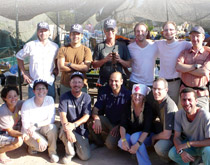
Prem Ramaswami (E'04), a product manager at Google, found himself in an overcrowded Haitian church just after the 2010 earthquake. Many of those seeking refuge were singing and dancing to take their minds off of the devastation of lost loved ones and destroyed homes. Their fortitude inspired Ramaswami and the other Google volunteers to create the Google Crisis Response team, which makes critical information accessible in times of disaster. Today, Ramaswami is on educational leave from Google, but for his efforts there, he has been recognized by Century Council as one of "20 People to Watch," which honors individuals who have "distinguished themselves through their leadership, ideas, and commitment."
How did Google get involved with Haiti relief efforts?
We quickly built an online database that combined person-finding tools from the Red Cross, The New York Times, and others. Before, if you were missing a relative, you had to go to those tools individually—not to mention they all were in English. We created one database that can be translated into 58 languages.
How soon after the earthquake did you go to Haiti?
I led a team in Haiti about two weeks into the disaster. It was humbling to see not only the destruction and chaos, but the relief efforts being done by NGOs. We saw how the Internet has become the backbone for NGOs in lots of innovative ways, like social media and SMS being used to help find people stuck in rubble.
What led to the establishment of Google's Crisis Response team?
We realized the dire need for accurate, timely information in the aftermath of a catastrophe, which is a natural extension of Google's mission to organize the world's information. We were utilized after the [2011] earthquake in Japan. For example, during the rolling blackouts in Tokyo, we collected information from different government sites and showed it online.
Something at CMU led you into this work?
Freshman year, I helped start a spiritual organization called Om. That year, there was a horrible earthquake in India. We teamed with a graduate organization, and before you knew it, we collected almost $32,000. It taught me the power in mobilizing people. Also, there was my entrepreneurship class. It helped me understand how to push an organization to work on potentially disruptive projects, taught me leadership.
—as told to Lorelei Laird (DC '01)



